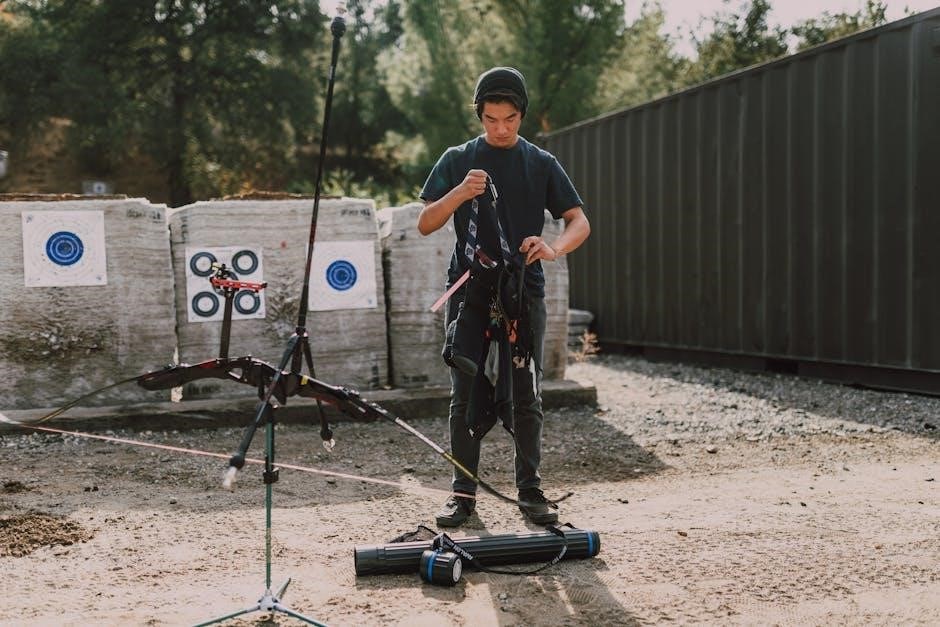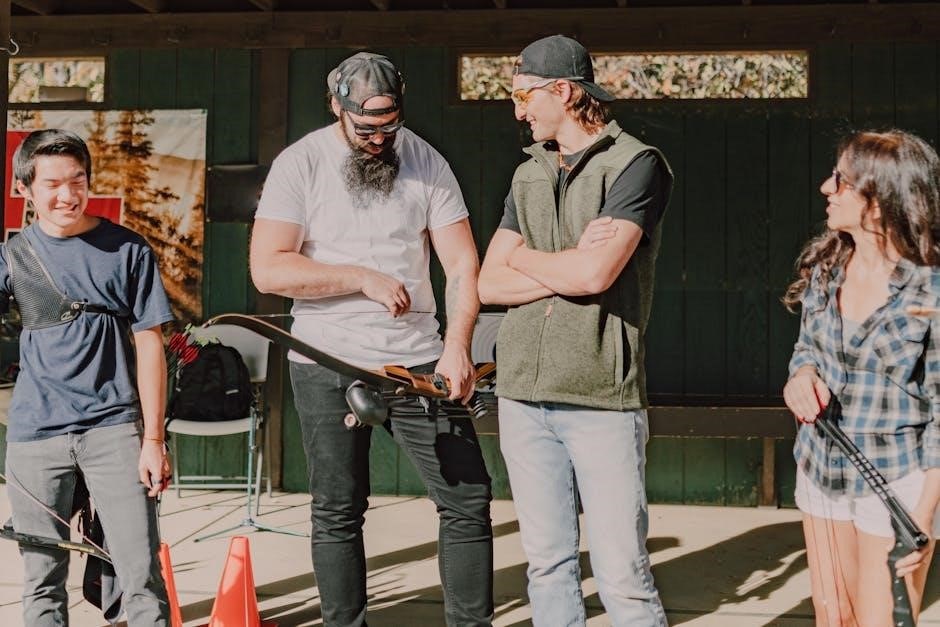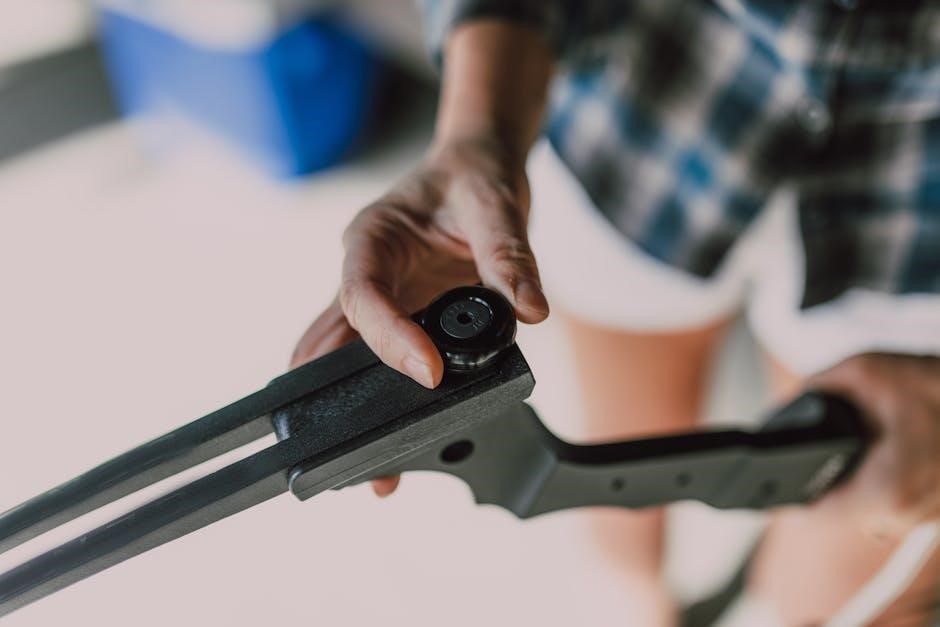Becoming a hunting guide requires a combination of skills, knowledge, and compliance with legal requirements. It involves leading clients safely and ethically during hunting trips, ensuring a memorable experience while adhering to wildlife regulations. The role demands expertise in hunting techniques, wildlife biology, and outdoor survival, as well as strong communication and safety protocols to protect both clients and the environment.
Understanding the Role of a Hunting Guide
A hunting guide is responsible for leading clients on safe and successful hunting trips, ensuring a memorable experience while adhering to ethical practices. The role involves planning expeditions, tracking wildlife, and sharing expertise on hunting techniques. Guides must possess deep knowledge of local ecosystems, weather conditions, and animal behavior. They also manage client safety, communicate effectively, and enforce legal and environmental regulations. The position requires physical stamina, patience, and strong interpersonal skills to cater to diverse client needs. Ethical hunting practices and respect for nature are paramount, making the guide both an educator and a steward of the outdoors.
Importance of Licensing and Certification
Licensing and certification are essential for hunting guides to operate legally and professionally. They ensure guides meet state-specific requirements, demonstrating expertise in hunting laws, safety, and ethics. Certifications like first aid and CPR are often mandatory, emphasizing client safety. These credentials build trust and credibility, attracting clients and ensuring compliance with regulations. Licensing also verifies a guide’s knowledge of local ecosystems and hunting practices, protecting both clients and the environment. Without proper certification, guides risk legal penalties and damage to their reputation. Thus, obtaining and maintaining licenses and certifications is crucial for a successful and responsible guiding career.

Education and Training Requirements
Pursuing formal education in wildlife management or biology is beneficial; Guide schools and specialized programs offer practical training. First aid and CPR certifications are essential requirements.
Formal Education and Relevant Courses
While a formal degree is not mandatory, studying wildlife management, biology, or environmental science provides a strong foundation. These courses cover essential topics like animal behavior, habitat conservation, and ecological principles, which are crucial for understanding hunting practices and managing wildlife effectively. Additionally, many guide schools offer specialized programs that focus on hunting techniques, outdoor survival, and safety protocols. These educational pathways ensure aspiring guides gain both theoretical knowledge and practical skills, making them well-rounded professionals in the field. Such education also enhances credibility and prepares individuals for the challenges of leading hunting expeditions responsibly.
Guide Schools and Specialized Programs
Enrolling in guide schools or specialized programs is a proactive step for aspiring hunting guides. These institutions offer comprehensive training in hunting techniques, wildlife management, and safety protocols, equipping students with practical skills. Courses often cover tracking, navigation, and ethical hunting practices, ensuring guides can lead expeditions effectively. Many programs include hands-on experiences, allowing participants to apply their knowledge in real-world scenarios. Additionally, these schools may provide networking opportunities with experienced guides and industry professionals, which can be invaluable for career advancement. Completing such programs not only enhances one’s expertise but also demonstrates a commitment to professionalism, making graduates more competitive in the job market.
First Aid and CPR Certification
First aid and CPR certification are essential requirements for becoming a hunting guide. These certifications ensure guides can provide immediate medical assistance in remote areas where professional help may be delayed. Most states and employers mandate these certifications, as they are critical for ensuring client safety during hunting expeditions. Courses typically cover wound management, trauma response, and emergency protocols, equipping guides with the skills to handle accidents effectively. Certifications must often be renewed periodically to stay current with the latest medical practices. Obtaining these credentials not only meets legal requirements but also builds client trust and confidence in the guide’s ability to manage emergencies responsibly and efficiently.

Licensing and Certification Process
Obtaining a hunting guide license involves state-specific requirements, including written exams, fees, and document submissions. Certification ensures compliance with regulations and demonstrates professional competence to clients.
State-Specific Licensing Requirements
Licensing requirements for hunting guides vary by state, with some mandating written exams, hunting proficiency demonstrations, or completion of specific training courses. Certain states require guides to be at least 18 years old and pass a background check. Applications often involve submitting forms, paying fees, and providing proof of certifications like first aid and CPR. Some states also require affiliation with a registered outfitter or completion of guide-specific programs. Additionally, certain areas may demand permits for activities like trapping or guiding on public lands. It’s crucial to research and comply with local regulations to ensure eligibility for a hunting guide license.
Obtaining a Hunting Guide License
To obtain a hunting guide license, applicants must meet specific state requirements, which often include passing a written exam with a minimum score of 70%. Applications can be submitted online or in-person at designated offices, requiring a valid hunting license and proof of certifications like first aid and CPR. Fees vary, with some states charging around $250 plus GST. Applicants must also complete guide-specific training courses in some regions. Once approved, licenses typically need to be renewed annually. Ensure compliance with local regulations and submit all required documents to secure the license successfully.
Additional Permits and Certifications
Beyond the hunting guide license, additional permits and certifications are often necessary to operate legally and effectively. Many states require first aid and CPR certifications to ensure client safety during expeditions. Special permits, such as trapping or furbearer harvest permits, may be needed depending on the type of hunting activities offered. Some regions also mandate specific training courses covering legal issues, safety precautions, and best practices. These requirements vary by location, so thorough research of state-specific regulations is essential. Acquiring these certifications not only meets legal obligations but also enhances credibility and trust with clients, making them essential for a successful guiding career.

Essential Skills and Knowledge
Essential skills include tracking, hunting techniques, wildlife biology, and outdoor survival. Guides must possess in-depth knowledge of hunting laws, ecosystems, and animal behavior to ensure safe and successful expeditions.
Wildlife Management and Biology Basics
Understanding wildlife management and biology is crucial for hunting guides. This includes knowledge of ecosystems, animal behavior, and conservation principles. Guides must recognize habitats, track patterns, and predict movement. Studying species biology helps in ethical hunting practices and ensures sustainable wildlife populations. Familiarity with local flora and fauna enhances navigation and client education. Additionally, guides need to stay informed about ecological changes and hunting regulations to make informed decisions. This foundation allows guides to lead safe, successful, and environmentally responsible hunting expeditions while promoting conservation efforts. Continuous learning in wildlife biology ensures guides remain effective and knowledgeable in their profession.
Tracking and Hunting Techniques
Mastering tracking and hunting techniques is essential for a successful hunting guide. Guides must develop skills in observing animal signs, such as footprints, droppings, and rubs, to locate game effectively. Understanding animal behavior, habitat preferences, and movement patterns is critical. Proficiency in using tools like binoculars, rangefinders, and GPS devices enhances tracking accuracy. Knowledge of hunting methods, such as calling, stalking, or ambushing, ensures effective strategies. Guides must also be adept at handling firearms or archery equipment safely and ethically. These skills allow guides to lead clients to successful hunts while promoting fair chase and responsible hunting practices. Continuous practice and adaptation to wildlife behavior are key to maintaining expertise.
Outdoor Survival and Navigation Skills
Outdoor survival and navigation skills are crucial for hunting guides to ensure safe and successful expeditions. Guides must be proficient in reading maps, using compasses, and navigating with GPS devices. Understanding how to handle emergencies, such as finding shelter, starting fires, and locating water sources, is essential. Knowledge of terrain, weather patterns, and natural hazards helps prevent accidents. First aid and CPR certification are often required to address injuries or illnesses in remote areas. These skills ensure guides can lead clients safely, even in challenging environments, while maintaining a deep connection with nature and promoting responsible outdoor practices. Continuous practice reinforces these critical abilities.

Gaining Practical Experience
Gaining practical experience is vital for becoming a skilled hunting guide. This involves apprenticeships, volunteering, and building a portfolio of hunting experiences to demonstrate expertise and reliability.
Apprenticeships and Mentorship Opportunities
Apprenticeships and mentorship programs are crucial for gaining hands-on experience in hunting guiding. Working under experienced guides allows you to learn practical skills, such as client management, safety protocols, and wildlife tracking. Mentorship provides valuable insights into the industry, helping you understand legal requirements and ethical hunting practices. Many guide schools offer apprenticeship opportunities, enabling you to shadow seasoned professionals and build confidence in leading hunting trips. These experiences not only enhance your technical abilities but also foster networking opportunities, which are essential for establishing a successful career as a hunting guide.
Volunteering for Hunting Expeditions
Volunteering for hunting expeditions is a valuable way to gain practical experience and build your skills as a hunting guide. By assisting experienced guides, you can learn about client management, safety protocols, and effective hunting strategies. Volunteering also provides opportunities to network with professionals in the field, which can lead to mentorship and future job opportunities. Additionally, volunteering allows you to observe and participate in real-world scenarios, helping you develop the confidence and expertise needed to lead successful hunting trips. This hands-on experience is essential for understanding the challenges and responsibilities of the role, making you a more credible and capable guide.
Building a Portfolio of Hunting Experiences
Building a portfolio of hunting experiences is crucial for establishing credibility as a guide. Documenting successful hunts, client testimonials, and your expertise in various hunting techniques showcases your skills. Include photos, stories, and details about the challenges and strategies used during trips. This portfolio serves as a visual representation of your knowledge and reliability, helping potential clients trust your abilities. Regularly updating your portfolio with new experiences demonstrates continuous growth and adaptability in the field. A strong portfolio not only attracts clients but also highlights your dedication to ethical hunting practices and client satisfaction, making it a vital tool for your professional development and marketing efforts.

Understanding Local and National Regulations
Comprehending local and national hunting laws is essential. Guides must research state and federal regulations, ensuring compliance with licensing, permits, hunting seasons, and land access rights.
Researching State and Federal Laws
Understanding state and federal hunting laws is crucial for aspiring guides. Each state has specific regulations regarding hunting licenses, permits, and seasons. Guides must research these laws thoroughly to ensure compliance. Federal laws, such as those protecting endangered species, must also be considered. Additionally, knowledge of land-use rights and access restrictions is essential. Staying updated on legal changes ensures guides operate within the law. Resources like state wildlife agency websites and legal guides can provide detailed information. Non-compliance can result in fines or loss of licensing, making legal knowledge a fundamental step in becoming a responsible and successful hunting guide.
Compliance with Hunting Seasons and Limits
Adhering to hunting seasons and bag limits is essential for ethical and legal hunting practices. Guides must familiarize themselves with state-specific regulations, as seasons vary by species and location. Understanding these rules ensures hunts remain sustainable and within legal boundaries. Ignorance of seasonal restrictions or bag limits can lead to fines or license revocation. Guides must also educate clients on these regulations to prevent violations. Compliance not only protects wildlife populations but also upholds the guide’s professional reputation and ensures a safe, lawful experience for all participants. Staying informed through wildlife agency resources is crucial for maintaining adherence to these critical guidelines;
Understanding Land Use and Access Rights
Understanding land use and access rights is crucial for hunting guides to ensure legal and ethical hunting practices. Guides must identify public and private lands, obtaining necessary permits for access. Respecting property rights and trespassing laws is essential to avoid conflicts. Familiarity with state-specific regulations regarding land access ensures compliance. Guides must communicate these boundaries to clients, ensuring they understand where hunting is permitted. This knowledge protects both the guide’s reputation and the client’s experience, fostering a responsible and lawful hunting environment. Staying informed about land ownership changes and access restrictions is vital for maintaining seamless and ethical hunting operations.

Developing Safety Protocols
Developing safety protocols involves first aid, CPR certification, and creating emergency response plans to ensure client safety during hunting expeditions.
Creating Emergency Response Plans
Creating emergency response plans is crucial for hunting guides to ensure preparedness for unexpected situations. Plans should include clear communication strategies, evacuation routes, and emergency contact information. Guides must outline steps for handling injuries, weather emergencies, or equipment failures. Regular updates and reviews of these plans are essential to adapt to changing conditions and ensure client safety. Having a well-defined emergency response plan not only protects clients but also demonstrates professionalism and responsibility. Guides should practice these protocols during training and simulations to build confidence and efficiency in real-life scenarios.
Implementing Safety Measures for Clients
Implementing safety measures for clients is a top priority for hunting guides. This includes conducting thorough risk assessments, providing pre-hunt safety briefings, and ensuring proper equipment usage. Guides must enforce the use of safety gear, such as tree stands and firearms safety devices. Clear communication about potential hazards and emergency procedures is essential. Regular inspections of gear and equipment help prevent accidents. Additionally, guides should stay informed about weather conditions and wildlife behavior to anticipate and mitigate risks. By prioritizing client safety, guides build trust and ensure a secure and enjoyable hunting experience. These measures are vital for protecting both clients and the guide during expeditions.
Regularly Updating Safety Certifications
Regularly updating safety certifications is crucial for hunting guides to maintain professionalism and compliance with regulations. Certifications like first aid and CPR must be renewed periodically to ensure guides are equipped to handle emergencies. Many states require these certifications for licensing, making ongoing training essential. Additionally, guides should stay updated on the latest safety protocols and industry standards. Refreshing knowledge on emergency response plans and wilderness survival techniques ensures preparedness for unexpected situations. By keeping certifications current, guides not only meet legal requirements but also enhance client trust and safety. This ongoing commitment to safety is vital for a successful and reputable guiding career.
Building a Professional Network
Building a professional network is essential for hunting guides. Join associations, attend workshops, and connect with experienced guides to share insights and gain industry knowledge.
Joining Hunting Guide Associations
Joining hunting guide associations enhances credibility and provides valuable resources. These organizations offer networking opportunities with experienced guides and industry professionals. Members gain access to training materials, legal advice, and updates on regulations. Associations often host workshops and seminars, helping guides improve their skills and stay informed. Many require members to adhere to ethical standards, ensuring professionalism and client trust. By joining, guides can also benefit from marketing support and shared knowledge, which helps attract clients and build a successful career. These associations play a crucial role in fostering growth and maintaining high standards within the profession.
Networking with Experienced Guides
Networking with experienced guides is crucial for building a successful career. Seasoned professionals offer valuable insights, practical advice, and mentorship, helping you refine your skills and gain industry knowledge. Connecting with established guides can also open doors to job opportunities and partnerships. Many experienced guides share knowledge about effective hunting techniques, client management, and regulatory compliance. Additionally, networking fosters collaboration and support within the community, which is essential for navigating challenges. By building strong relationships, you can gain access to resources, such as exclusive hunting locations and client referrals. This professional network not only enhances your credibility but also contributes to long-term career growth and success in the field.
Attending Industry Workshops and Seminars
Attending industry workshops and seminars is a vital step in becoming a skilled hunting guide. These events provide opportunities to learn from experienced professionals, gain insights into new techniques, and stay updated on the latest industry standards; Workshops often cover topics such as advanced hunting strategies, wildlife management, and safety protocols, which are essential for guiding clients effectively. Additionally, seminars may focus on legal and ethical considerations, ensuring compliance with regulations. By participating in these events, you can enhance your knowledge, improve your guiding skills, and stay competitive in the field. This continuous learning approach is key to building a reputable and successful career as a hunting guide.
Marketing and Business Skills
Developing strong marketing and business skills is crucial for attracting clients and managing a successful hunting guide service. A well-structured business plan and online presence are essential;
Creating a Business Plan for Guide Services
A well-crafted business plan is essential for establishing a successful hunting guide service. It outlines target markets, services offered, pricing strategies, and marketing approaches. Define your niche, whether it’s specialized hunts or family-friendly trips. Include financial projections, operational logistics, and legal requirements. A clear plan helps attract investors and builds credibility with clients. Additionally, it guides decision-making and ensures sustainability. Tailor your plan to reflect your unique strengths and the demands of your region. Regularly review and update it to adapt to industry changes and client preferences, ensuring long-term growth and success in the competitive hunting guide market.
Developing a Strong Online Presence
Building a robust online presence is crucial for attracting clients and promoting your hunting guide services. Start by creating a professional website showcasing your expertise, services, and contact information. Use search engine optimization (SEO) to improve visibility in search results. Engage with potential clients on social media platforms like Instagram and YouTube by sharing hunting tips, success stories, and behind-the-scenes content. Leverage online reviews and testimonials to build credibility. Consider listing your services on directories like Google My Business. Regularly update your content to keep clients informed and interested. A strong online presence helps establish trust and attracts a wider audience to your guiding business.
Marketing Strategies for Attracting Clients
Effective marketing is key to attracting clients as a hunting guide. Utilize social media platforms to share engaging content, such as hunting success stories and tips, to build a community. Attend outdoor expos and events to network with potential clients. Offer referrals incentives to current clients for bringing in new customers. Create email newsletters to keep clients informed about upcoming trips and promotions. Highlight your unique selling points, such as exclusive locations or specialized hunting expertise, to stand out from competitors. Consider offering discounted rates for first-time clients to build trust and loyalty. Ensure your marketing materials emphasize ethical hunting practices and sustainable wildlife management to appeal to environmentally conscious clients.

Client Management and Communication
Effective client management involves understanding their needs, preferences, and skill levels to tailor hunting experiences. Clear communication builds trust, ensuring safety and satisfaction during expeditions.
Understanding Client Needs and Expectations
Understanding client needs and expectations is crucial for a successful hunting guide. Each client may have different goals, such as bagging a specific species or enjoying a scenic hunt. Guides must assess their clients’ skill levels, physical capabilities, and preferred hunting styles to tailor the experience. Clear communication helps set realistic expectations and ensures satisfaction. Additionally, guides should be prepared to adapt plans based on client feedback and conditions. Meeting these needs builds trust and enhances the overall quality of the hunting trip, making clients more likely to return or recommend the guide to others.
Effective Communication Techniques
Effective communication is essential for hunting guides to ensure a safe and successful experience. Guides should practice active listening to understand client goals and concerns. Clear, concise instructions help clients follow safety protocols and techniques. Patience and adaptability are key, as clients may vary in skill levels and physical abilities. Using visual aids, like maps or demonstrations, can enhance understanding. Maintaining a positive and approachable demeanor fosters trust and camaraderie. Regular check-ins with clients ensure their needs are met and any issues are addressed promptly. Strong communication skills not only improve client satisfaction but also contribute to a safer and more enjoyable hunting environment for everyone involved.
Handling Client Safety and Emergencies
Hunting guides must prioritize client safety and be prepared for emergencies. Conducting thorough safety briefings and ensuring clients understand risks is crucial. Guides should develop emergency response plans, including evacuation procedures and first aid protocols. Carrying essential gear like a first aid kit, communication devices, and navigation tools is vital. In case of injuries or incidents, guides must remain calm, assess situations quickly, and take appropriate actions. Regular safety drills and updates on emergency protocols ensure preparedness. Effective communication during crises helps reassure clients and maintain order. By being proactive and well-prepared, guides can minimize risks and ensure a safe, enjoyable experience for all clients.
Continuous Learning and Professional Development
Continuous learning is crucial for hunting guides to stay updated on regulations, improve skills, and adapt to new techniques. Ongoing training ensures high standards and safety.
Staying Updated on Hunting Regulations
Staying updated on hunting regulations is essential for guides to ensure compliance and avoid legal issues. Regulations vary by state and species, covering seasons, bag limits, and permitted methods. Guides must monitor changes in local and federal laws, including updates on endangered species and land-use restrictions. Subscribing to wildlife agency newsletters, attending seminars, and joining professional associations are effective ways to stay informed. Knowledge of permits, licensing requirements, and harvest limits ensures ethical and lawful practices. Regular updates also help guides adapt to environmental changes and manage wildlife sustainability. Continuous awareness of regulatory changes is vital for maintaining credibility and providing safe, lawful hunting experiences for clients.
Improving Hunting and Guiding Skills
Improving hunting and guiding skills involves continuous learning and hands-on experience. Attending workshops, seminars, and specialized training programs can enhance your knowledge of hunting techniques, wildlife behavior, and outdoor survival. Mentorship from experienced guides provides valuable insights and practical tips. Additionally, practicing tracking, shooting, and field skills regularly ensures proficiency. Learning from client feedback helps refine communication and leadership abilities. Staying adaptable to different hunting environments and conditions is crucial. By dedicating time to skill development, guides can offer safer, more successful, and enjoyable hunting experiences, building a strong reputation and client trust. Continuous improvement is key to long-term success in this profession.
Engaging in Ongoing Professional Training
Engaging in ongoing professional training is essential for maintaining and enhancing skills as a hunting guide. Regular participation in workshops, seminars, and specialized courses ensures familiarity with the latest techniques, safety protocols, and regulatory changes. Many states require guides to periodically renew certifications, such as first aid and CPR, to ensure client safety. Additionally, advanced training in wildlife management, tracking, and outdoor survival can further elevate a guide’s expertise. Continuous learning not only improves competency but also demonstrates a commitment to professionalism, fostering trust and confidence among clients. Staying informed and updated is vital for delivering safe, successful, and enjoyable hunting experiences.



